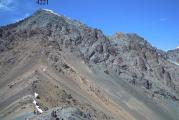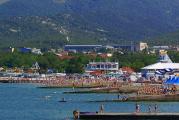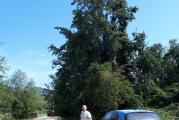The city of Acre is the Crimean Atlantis. acre crimea acre where
Acre - city in Israel, in Western Galilee, on the coast mediterranean sea, about eighteen kilometers from the city of Haifa. The first mention of Acre dates back to 1456 BC: the name of the city is carved on the wall of the Karnak temple of Amun in Thebes among other cities conquered during the first military campaign of Thutmose III. It is known that in the fourteenth century BC the Hittites took possession of the city, but in the thirteenth century BC it was again recaptured by the Egyptians, led by the pharaoh Seti I. At that time it was a Canaanite city.
In 701, Acre was captured by Sennacherib, the Assyrian king. After that, the city was under the rule of Babylonia, and then - the powers of the Achaemenids, under which it became naval base, very important in the war against Egypt.
In 333 BC, Acre was conquered by Alexander the Great and turned into a Greek colony. Gradually, Acre becomes an important port and one of the largest cities Hellenistic era.
After the death of Alexander the Great, the city falls under the rule of the Egyptian Ptolemies, who rename it Ptolemais.
In 219 BC city of Acre becomes part of the Seleucid Empire and receives a new name - Antioch. After the death of Antiochus VII Sidet, the city, passing from one Hellenistic ruler to another, gradually becomes independent and receives the status of a free Greek policy.
Under Alexander Jannaeus, the Jewish Hasmonean state tried to capture Acre, and Jewish troops even laid siege to the city. However, Acre turned for help to Ptolemy Soter (Lafur), who was not slow to arrive with an army of thirty thousand. After this, the siege was lifted.
In 52-54 BC, through the efforts of Pompey, Acre becomes a possession of the Roman Empire. Under the Romans, the city significantly expanded its borders. The city retained its importance in the Byzantine era.
In 638, Acre was captured by the Arabs, during which a new port was built in the city in 804-868.
In 1104, during the First crusade acre was conquered by the crusaders. However, in 1187 the city was taken by Saladin. Four years later, after a two-year siege, the crusaders return Acre to their possessions. The city becomes the capital of the Kingdom of Jerusalem. He is surrounded by powerful fortifications and give a new name - Saint-Jean d "Acre. The knightly orders of the Templars, Hospitallers, and then the Teutonic Order build hospitals, residential buildings, warehouses in the city, administrative buildings and churches. Crusader orders, as well as merchants from Pisa, Genoa, and Venice, waged endless disputes over spheres of influence in the city. In 1256, an armed conflict takes place between the Genoese and the Venetians, called the War of St. Sava, and the knights of the orders are gradually drawn into it. As a result, Acre, weakened by civil strife, was captured by the Mamluks in 1291. They destroy the city and massacre many Christians and Jews. After that, Acre existed as a small fishing village for four hundred years. The city was rebuilt only in the middle of the fourteenth century.
In 1517, Acre was conquered by the Ottoman Turks. Starting from 1721, the Turks gradually rebuilt the city anew: they erected a fortress, walls in Acre, built mosques, a Turkish bath, a palace, a bazaar.
Was there Atlantis? The answer is unequivocal - yes! This can be confirmed by any tourist who has visited the Crimea. Ancient city Acre, which once stood on the shore Kerch Strait, at the beginning of our era sank under water. The waves of the strait hid the streets, houses and the fortress wall. Why not this mythical island-state?
Where is the city of Acre in Crimea?
"In life" - so to speak - it was located in the very southern point. The famous ancient geographer Strabo claimed that the policy is an ice-free port belonging to. The nearest to the location of the city is modern locality- Naberezhnoye village. Nearby are also found the village of Zavetnoe and. And all this is 30 km south of Kerch.
The history of the ancient port policy
According to ancient authors, Acre has existed since the 6th century. BC, and a century later it acquired its own fortifications from the land side in order to protect against nomadic raids. The port is described as a small settlement, but its importance for Greek navigation leaves no doubt. It stood on a cape, creating excellent conditions for ships. At the beginning of our era, approximately in the 4th century, there was a simultaneous sinking of part of the coast and changes in the water balance of the Black Sea. So Acre was under the water column, turning into the Black Sea Atlantis.
The second stage in the history of the ancient city is the return to the people. In search of Acre, toponymy played a cruel joke with archaeologists. The word "acra" is translated from Greek as "hill", "hill" (compare - "Acropolis"). Well, who will look for a hill under water? No map could help - they simply did not have a corresponding cape that had sunk centuries ago.
The sunken city was found by the will of fate. First, the researchers, examining the coast in this place, found a certain amount of material from Greek and Roman times. And in 1982, Lesha Kulikov, a schoolboy from, found a coin of the Bosporan kingdom on the shore. She became the starting point. In the 90s. of the last century, a graduate of Moscow University A.V. Kulikov led an expedition to explore Acre. At first, excavations were carried out on land, only then they moved under the sea surface.
Crimean Atlantis required a lot of money for its study, so from the very beginning Ukraine turned to Russia for help - the expedition was international. There were years when the work was not carried out at all - there was no funding. "Black archaeologists" at that time shamelessly robbed the monument - just give them free rein! But now normal, honest scientists have returned to the Crimea. The ancient city of Acre is among the priorities for archaeological research. There are plans for the subsequent transformation of the monument into a special underwater museum. There are also concerns - the observed changes in currents threaten the safety of the city.
Homeland of the Trojan hero
Some authors seriously consider Acre to be the birthplace of Achilles himself. There are mentions of such a name in ancient Greek literature. However, it was very common among the Greeks - for the simple reason that they preferred to build on the hills, so history is from the realm of legends. But it has been convincingly proven that Achilles was honored in the Crimea.
Crimean Atlantis: scuba diving excursion
Today, the priority direction of the Crimean underwater archeology is Acre. Crimean Atlantis is a real treasure for archaeologists, sea water has preserved such objects that they could never lie in the ground for millennia.  In particular, in the last season, the wooden foundations of the fortress towers and the comb were discovered here - the finds are completely unique, such an ancient tree is not found on the surface of the earth.
In particular, in the last season, the wooden foundations of the fortress towers and the comb were discovered here - the finds are completely unique, such an ancient tree is not found on the surface of the earth.
Acre can be visited by divers during the work of the expedition, usually the field season in Crimea coincides with the tourist season - from May to October. Experts do not mind, but categorically forbid them to touch anything on the monument. The stone fortress wall of the city, quite well preserved, is clearly visible, houses and streets are visible. In one of the buildings, a completely whole hearth was recently discovered - the unifying center of the family of the ancient Greek.
The underwater museum is in its infancy - it's too new for Crimea. Yes, and there is still a lot of manipulations, the settlement is large - according to scientists, at least 1000 people lived there permanently (according to the concepts of that time, a decent town). The interests of science are in the first position - even a temporary drainage of the territory of Acre is planned by building a dam. However, both the leadership of the peninsula and experts consider the archaeological center a promising project.
It is difficult to take underwater photos, but professional scientists are excellent at it. They regularly publish "portraits" of ancient, ancient Acre. In November last year, in Feodosia, which sheltered on its perimeter, the premiere took place
acre- small ancient Greek seaport(according to ancient Greek authors - a small village) in the Crimea, which existed from the end of the 6th century BC. e. to the 4th century AD e. It was located at the southernmost point of the Kerch Strait, at the foot of Cape Takil (according to Strabo, an ice-free port of the Bosporan kingdom). Due to the lowering of the coast, part of the settlement - layers of the 4th century BC. e., including a 30-meter section of the defensive wall, is under water. Acre is called the "Crimean Atlantis".
Research
In addition to Strabo, Acre was mentioned by Ptolemy, Stephen of Byzantium, in the periplus of Pseudo-Arrian and Aelius Herodian. The first survey in 1976 was carried out by the researchers of the ancient settlement Kitey E.A. Molev and N.V. Moleva. Anthropomorphic steles and an amphora brand were found on the seaside terrace. In the early 1980s on a sandy spit between Lake Yanysh and the A.V. Kulikov found more than a hundred antique coins and other antique objects near the scientific base of AzCherNIRO. These findings have inspired further research. In the summer of 1982, V.N. Kholodkov (Kerch Museum) conducted the first excavations, both on the embankment and on the hill south of the lake, during which cultural strata of the ancient era were discovered without clearly defined stratigraphy. A.N. Shamrai discovered the remains of an ancient wall under water and a well. In 1983-1985. K. K. Shilik (LOIA of the USSR Academy of Sciences) began underwater research in this area and established that the ancient city lies at a depth of up to 4 m, and to the east of it, seaward and up to a depth of 7 m, there was a harbor. In the course of underwater reconnaissance, defensive walls, two towers and a well were discovered, in the filling of which seven amphoras of Heraclea Pontica of the 4th century BC were found. BC e., fragments of black-glazed dishes, a fragment of a lead anchor rod, wooden details made on a lathe.
Geography
The city occupied the northeastern tip of the cape formed by the mouth of the ancient nameless river and the Cimmerian Bosporus (Kerch Strait). Its territory probably had the shape of a trapezoid with an area of about 3.5 hectares, at present almost completely hidden by the waters of the Black Sea, with the exception of a small western section on a sandy bridge, which turned the mouth of the river into the modern Lake Yanysh off the coast of the Kerch Strait. Due to the transgression of the Black Sea, which began around the middle of the 1st millennium AD. e., the ancient city was at a depth of up to 4 m. The peculiarities of the wave regime in this part of the coast of the Kerch Peninsula led to the fact that the cultural layers of the ancient city were basically not eroded and its buildings were not completely destroyed, but only partially covered with sea sand.
Acre, city Acre, or Acre - in ancient times a city in Sicily, the ruins of which are located in the mountains near the source of Anapo, above the present Palazolo Acreide (west of Syracuse).
Encyclopedic Dictionary F.A. Brockhaus and I.A. Efron. - St. Petersburg: Brockhaus-Efron. 1890-1907 .
See what "Acre, city" is in other dictionaries:
- (St. Jean d Acre) see Akka ...
- ... Wikipedia
- (Akka, in ancient times Akko), at one time Ptolemais, small town in the northwest of Israel, located on a small cape on the northern side of Haifa Bay, 16 km northeast of Haifa. The city stands on a narrow coastal plain west of the Lower… Geographic Encyclopedia
At one time, Ptolemais, a small city in northwestern Israel, was located on a small promontory on the northern side of the Gulf of Acre, 16 km northeast of Haifa. The city stands on a narrow coastal plain west of Lower Galilee. Acre is the only... Collier Encyclopedia
Acre: Acre (Crimea) is an ancient Greek port city that was completely submerged in the fourth century BC. Acre cape in Greece. Acre quarter in Jerusalem. Acre is one of the names of the ancient city of Akko. Acre fortress in Syria. ... ... Wikipedia
- (Hebrew עיר דוד Ir David) the oldest populated area Jerusalem on the site of the ancient city of the period of the Jebusites (who called it Jebus), as well as the period of the First and Second Temples in Jerusalem. Already in the Bronze Age it was walled ... ... Wikipedia
Acre (according to the Chald. Hakra, from the Greek άκρα, high, fortified place) is the special name of one quarter of ancient Jerusalem, the so-called Lower City (Shuk gatakhton), surrounding upper city(own. Sion) in a semicircle from the north. This is the same one.... Encyclopedic Dictionary F.A. Brockhaus and I.A. Efron
This term has other meanings, see Acre (meanings). Acre Arab city. عقرة … Wikipedia
This term has other meanings, see Acre (meanings). Ancient city of Acre Country Ancient Greece... Wikipedia
This term has other meanings, see Acre (meanings). Akra (aram. Hakra, from other Greek άκρα, “high, fortified place”) is the name of one of the quarters of ancient Jerusalem, the so-called “Lower City” (Shuk ha takhton), ... ... Wikipedia
Books
- Library of Souls No Way Out of Peculiar Children's Home, Riggs R., Abaton. A mysterious vanished city, where the souls of the great strange ones are stored in the library... An old legend will remind of itself when Jacob, Emma and faithful Addison, in search of kidnapped children,… Category: Mystic. horror
- Soul Library. There is no way out of the Peculiar Children's House, Ransom Riggs, Abaton... The mysterious disappeared city, where the souls of the great strange ones are kept in the library... An old legend will remind of itself when Jacob, Emma and the faithful Addison, in search of kidnapped children,... Category: Horror and Mystery Series: Miss Peregrine Publisher: Book Club "Family Leisure Club", electronic book(fb2, fb3, epub, mobi, pdf, html, pdb, lit, doc, rtf, txt)
- Soul library. No Way Out of Peculiar Children , Ransom Riggs , The film, based on the first part, will hit the big screens in October 2016! The novel hit the New Your Times bestseller list.




